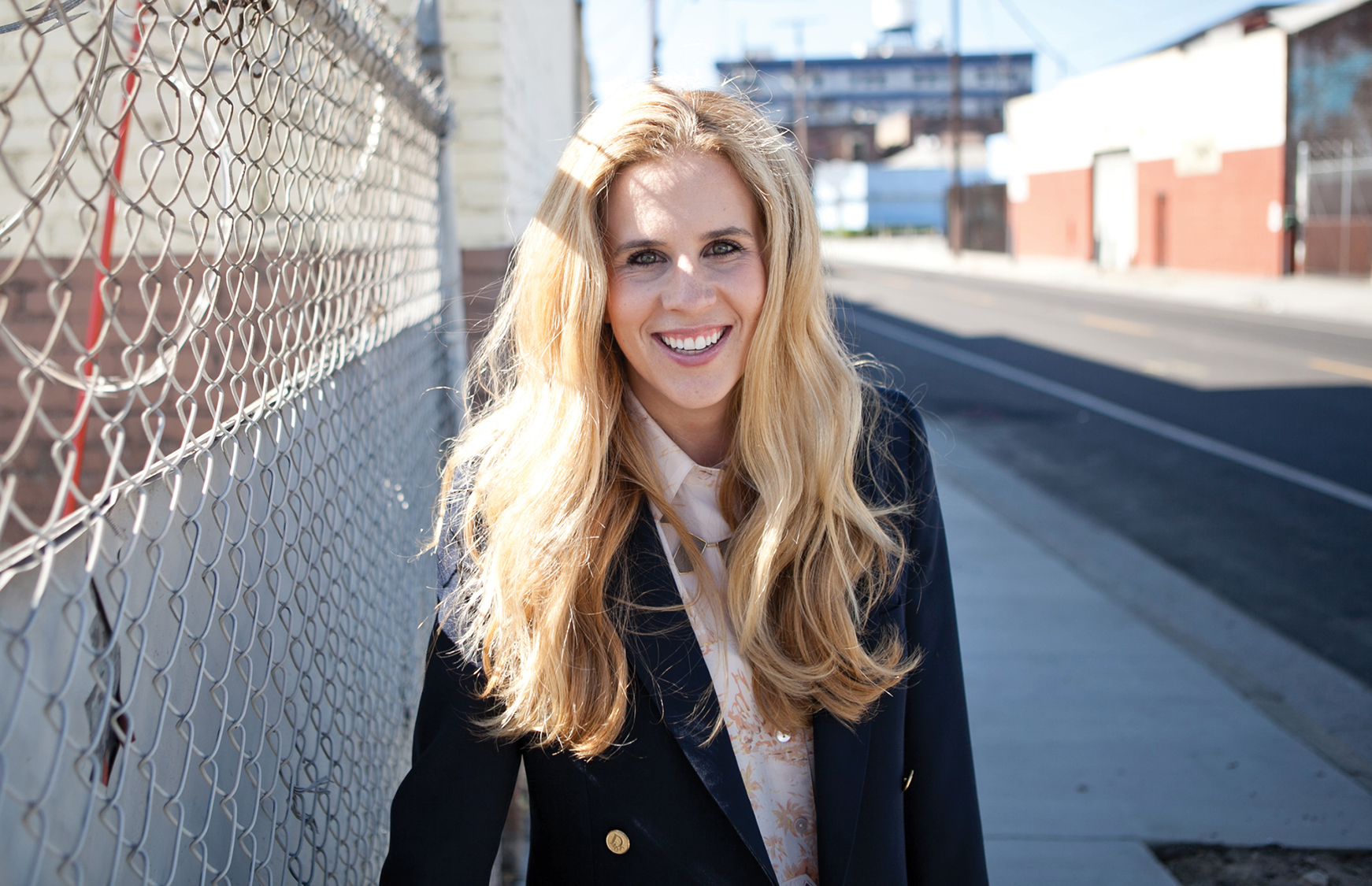Creativity can be worked into just about any field—it’s simply a matter of knowing how to coax it out and where to apply it. For bright and spirited Lynsey Eaton, 30, getting stuck in a practical box was not an option, so she took her degree in textiles and apparel and genially applied it to her job as a law associate—despite the fact that the descriptor “creative” isn’t often associated with the field.
Post-grad, Lynsey set her sights on fashion writing but, when the bills started piling up, she switched gears to a new horizon, one that would give her a more stable lifestyle—as an associate at a law firm. Yet, as fate would have it, Lynsey’s need for a creative outlet eventually led her to establish the now widely popular blog, LAW OF FASHION. The site ultimately garnered her a great deal of attention—especially from women wanting to translate their own passions into something that felt both enjoyable and grounded.
Although Lynsey has decided to hang her legal cap on the wall for a bit and is now steering course in a different direction (as co-founder for new fashion and lifestyle site, Tomboy KC), her degree and talents have helped her to create this and other new opportunities for herself. Her experience gave her the skills needed to be able to pursue all of her entrepreneurial endeavors with gumption, with confidence and with the wherewithal to make it happen despite the risks.
Her Starting Point
As a fashion major in college, when and where did your passion for law ignite? Tell us about your path from college graduation to law school admissions.
The story actually makes no sense. It is not how I would tell anyone to go about picking a career. I wouldn’t say that I ever really had a “passion” for law. I majored in English and textiles and apparel as an undergraduate. I thought I was going to become this big fashion writer and go work on a publication in New York City. So I moved to New York in 2004 and interned for W Magazine, did some work there and then came back to Austin to work for Brilliant Magazine.
Long story short, it was immediately apparent that I wasn’t able to support myself and my student loans on a publishing salary, and my father suggested I go to law school. Like a naive 22-year-old who doesn't know what they want with their life, I said okay. Looking back on it now, I got really lucky that it worked out for me. It's not something to do on a whim.
What made you choose Los Angeles as your next destination? Was it based on law school acceptance? What other factors made up that decision?
Los Angeles was another byproduct of my naive 22-year-old decision-making. I picked Pepperdine because I had lived in New York, Philadelphia, London and Texas and I had yet to live on the West Coast. That’s honestly the main reason I made the decision. Originally, I didn't think I was going to be on the West Coast more than three years. I was always very transient, loved to move around, be in new places and try new things. The plan was always to leave after law school, but then I met my husband. Eight years later, and I am only just now leaving.
One of the hardest law school decisions is picking a focus. What is yours and how did you decide?
Law school is hard because you can ”focus” your study on a certain area of the law, but that doesn't necessarily mean that's what you're going to do when you get out. The way the legal market works, especially these days, is you kind of have to do whatever there is to do. For me, I always knew that the fashion and apparel business was really important to me, so I started trying to figure out a way to tailor my education towards that field. This meant taking mostly intellectual property courses—trademark, copyright, etc.
Skip forward a few years, the firm I started my career at was very construction-focused. To some, the transition from construction to fashion would have seemed impossible. But it is important to remember that “fashion law” is really just the same areas of law you study in law school, just applied to the fashion industry. I was working as a commercial litigator, so it transitioned perfectly. The same principles that I was applying to all of my construction clients applied to the fashion industry as well, with the exception of a few different business considerations. It was important to see beyond the construction aspect of it. Although construction was fun and I loved my construction clients, I ultimately started setting myself up to work with clients in the fashion industry based upon my connections.
Explain how a creative background influenced your law career.
There is a lot of writing that goes into the legal profession. It was interesting because I come at things differently than a lot of people, which really helps in developing arguments. The same way it was beneficial to work with others that approach certain things differently than me, the more perspectives you have on an idea the more developed your argument is going to be. It made for a good mesh at the firm. I took a very non-traditional approach; a lot of places wouldn't have embraced that. But, it worked out well for us.
Were you ever intimidated to enter a career in law?
For sure! You would be naïve not to be. That said, I think I probably should have been a lot more nervous than I actually was. I have a tendency to throw myself into things and, once it has all worked out, I look back and realize I should have worried about it more.
Her Big Break
How did your previous job as an Associate for Gibbs Giden Locher Turner & Senet LLP come about? What factors did you consider when researching firms?
I tend to go with my gut. When I was interviewing for firms back in 2007, the economy wasn't as bad as it is now and we had more opportunities than people coming out of law school now—it's completely different! I went through on-campus interviewing and recruiting. I went on about fourteen interviews within a week—it was crazy. Then, I went on about half that many callback interviews and got quite a few job offers. Whenever I was making the final decision on where to go, I just went where it felt right; where I felt at home and liked the people, and where I felt I could truly see myself working. My decision was very focused on the environment and, as a result, I was really happy there. Many of my friends changed firms within one year of graduation and I have friends that are now working at their third law firm.
Although I recently left Gibbs, Giden to explore other opportunities, I was there for five years. I found a group of people who were very supportive of me as a person and who were focused on helping me become a better attorney. They recognized that I'm a creative person stuck in this practical box and, rather than force me to be someone I am not, they nurtured my creativity and helped it become an asset.
Your focus at the firm was business, commercial and construction litigation. Can you explain what your big picture duties and responsibilities were? How did your work affect the firm?
What's great about our office was that they threw me in from the very beginning. It wasn't baby steps. I was running cases from start to finish during year one. It was a good learning experience because I was learning something new every day. I was a litigator, so clients would call with either a problem that needed to be solved (anything from writing letters to people, to negotiating settlements, to filing lawsuits or responding to lawsuits that clients had filed against them). None of it was really "sexy” like you see in the movies. It was all very contractual. There is a lot of procedure involved, with the occasional hearing or motion.
What skills are essential to being a lawyer? What skills are specifically essential to working at a corporate law firm?
It's really important to be a good listener. People automatically judge attorneys and assume they are trying to jack up the bill or pull one over on someone else because attorneys know more about the law. I think it's a hard battle to try and beat that misconception.
The best way to avoid that stereotype is by listening to your client. If you are listening, you will understand your client's wants and you will be able to better serve them and avoid doing anything that will make them believe you don’t have their best interest in mind. You need to be empathetic and put yourself in your client’s shoes. You need to be able to see the difference between a good legal decision and a good business decision. Finding the balance between the two is key. Being thoughtful and analytical about decisions is also extremely important. You have to think about all aspects of the problem instead of jumping at the first possible solution.
There are many people that pursue law school because it’s a straightforward path and they are unsure of what they want to pursue otherwise. What advice do you have for people thinking about law school?
Don't go to law school unless you know you want to be an attorney. That is, unless you have money to spare. It's really easy whenever you don't know what you want to do, to say, "I'm going to go to law school." But there's an opportunity cost. It is an amazing education, but it’s also a really expensive one. Not to mention it takes a long time. I'm going to be paying off law school loans for twenty-five years. That is worth it for me, but if you don’t want to be an attorney, it might not be. When you get out, if you don't love the actual practice of law, you are likely going to go do it anyway in order to pay for school.
It's a hard profession if you don’t love it. It's very time consuming, you work a lot of hours and everyone is really intense. Do your research and go spend some time in a law firm, challenge yourself and know whether or not being an attorney is what you want. I got lucky—I loved where I worked and the people I worked with. It's been a really, really great thing for me. I've seen a lot of people not as happy.
A career in law has somewhat of a bad rep for its long hours and hard work. How would you explain the environment of a law firm? The people, office, work hours, etc.
It depends on the firm. I would say, again, my office was great but it's because the people and environment were amazing. It was high stress but I felt supported. If you go on an interview, you should ask your interviewer about the environment, whether or not they're happy and how long they've been there. That speaks volumes. If someone really loves the place, you'll be able to tell. It's hard to hide and no amount of money is worth being miserable.
When is the most challenging part of your job? What is the best part?
Here's the thing: you have to remember you're going to make mistakes. Everyone makes mistakes. Even partners make mistakes. My first mistake was probably my worst day at the office. You can do everything in the world to try and prevent it, but one day it is going to happen and all you can do is learn from it.
As for the best part: I worked on this huge case. It took three years and was very expensive. At the end of it, the client came up to me and said, “Thank you so much! You've been wonderful. I've really enjoyed working with you and I really hope we can stay in touch." It was just one of those moments. I could tell that we had actually made a difference. It was really nice and stood out as a major moment.
Her Perspective
If we had the chance to peek at your schedule, what would an average day look like? Do you have any special “me” routines to keep you balanced?
I think it's really important that people have a hobby or what I call a "thing.” No matter what your financial circumstances are or what is happening, you've got to be able to focus some of your energy on yourself.
My friend, for example, became a runner—that's his thing. For me, it was always writing. I started my blog as something to do and a way to focus on myself off the clock. When I was still at a law firm, I'd wake up at 5:30 a.m. and walk the dogs, get dressed and be in the office by 7:30 a.m. Then I always went and got myself Starbucks, even though there's coffee in the office. It's a little luxury, a moment away from the office before I went in and spent the rest of the day in there.
Speaking of your blog, LAW OF FASHION, how do you manage to fit it in on top of a busy work schedule? Why did you start your blog and what has been the most rewarding piece of it?
Being in the legal profession can be hard because you spend most of your time with attorneys. For me, that was a completely different world. I started LAW OF FASHION as a way to keep a piece of the old me alive amidst all of the legal jargon and briefcases. But it really became more than that. The blog opened up my world and I met a lot of really amazing, fun and creative people that have become some of my best friends in Los Angeles. But the most rewarding part of having the blog has been the emails I receive from readers. I like being there for people the way I wish someone had been there for me, like a mentor or someone to provide insight into the tough questions.
What were some of the struggles you have faced during your career? How did you overcome those hurdles?
My greatest struggle was definitely finding myself. As a self-admitted Type A personality, it's very easy to be crazy intense, but finding a balance between intensity and sanity was hard. It is important to be able to draw a line and learn when to focus on your career and when to focus on your life. You have to recognize that you’ll be more successful, productive and efficient if you do take the time to focus on yourself. It is important. For me, starting the blog played a huge role in overcoming that struggle.
Many women find it hard to translate their passions into a successful and fruitful career. What advice would give to women who struggle with this? How were you able to find your happy medium?
The most important thing to remember is that you can step outside the box; you don't have to follow a certain path. Whatever you want to do, go do it. But be calculated. You're not going to get anywhere if you don't take risks, but be smart about them. I would say I found my happy medium within a year of starting my blog. Before, I was so intense and concerned about my job that it was all I did. I struggled for a long time with my career, my life outside the office, the creation of the blog, the voice of the blog, etc. It’s funny to go back and read what I was putting up on the Internet during that time. It’s almost like going back and reading my 12-year-old diary. It is incredibly embarrassing and I would love to take it down. That said, I leave it up because I feel like it's honest. As silly as it may seem to me now, that is where I was.
Where do you hope your career will take you next?
My husband and I recently relocated to Dallas because he got a new job at a law firm there. For the moment, I am hanging up the legal hat. I'm taking my skills and using them to pursue some more entrepreneurial ventures. Specifically, I am co-founding a new website with a friend of mine. My day-to-day will be a lot different and, in a way, a lot more intense. I'm the one taking care of the business now! I'm excited about it; it was time for a change, a next step and a move forward. I'm grateful for the time I had at the law firm, the people and the lessons learned. I think it has allowed me to make this transition seamlessly and that’s truly a testament to how great of a place and experience it was.
You May Also Like
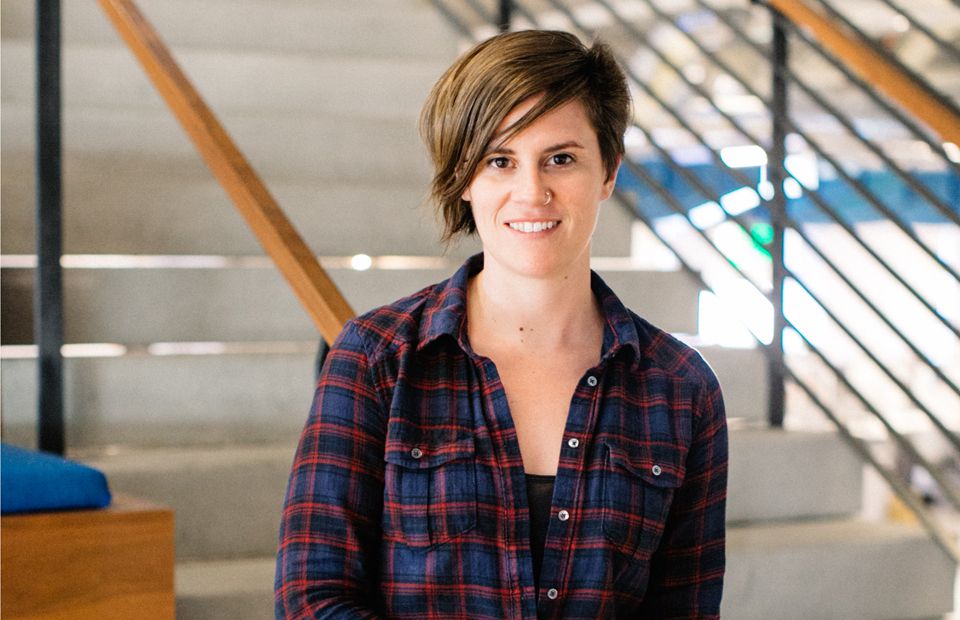
Media
How to Use Positive Reinforcement at Work—and Other Advice from a Pandora PM
"My advice to anyone who wants to get into product management is: check your ego at the door."
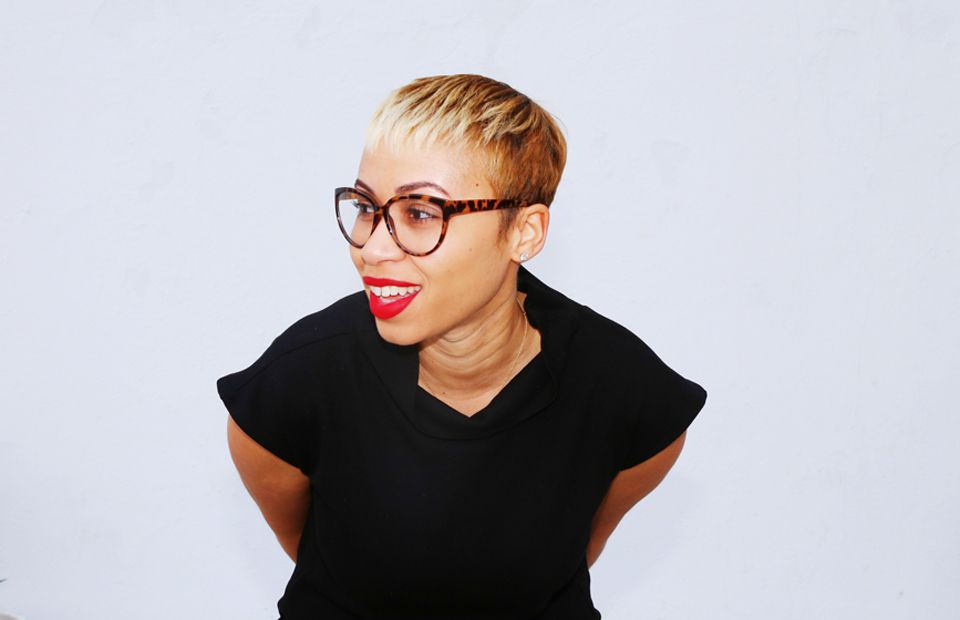
Media, Communications + Public Relations
How to Take Risks, Make a Switch, and Find a Career You Love—From a Woman Who's Done It 4 Times
Making your wildest dreams come true starts with understanding yourself—and Ahyiana Angel can help.
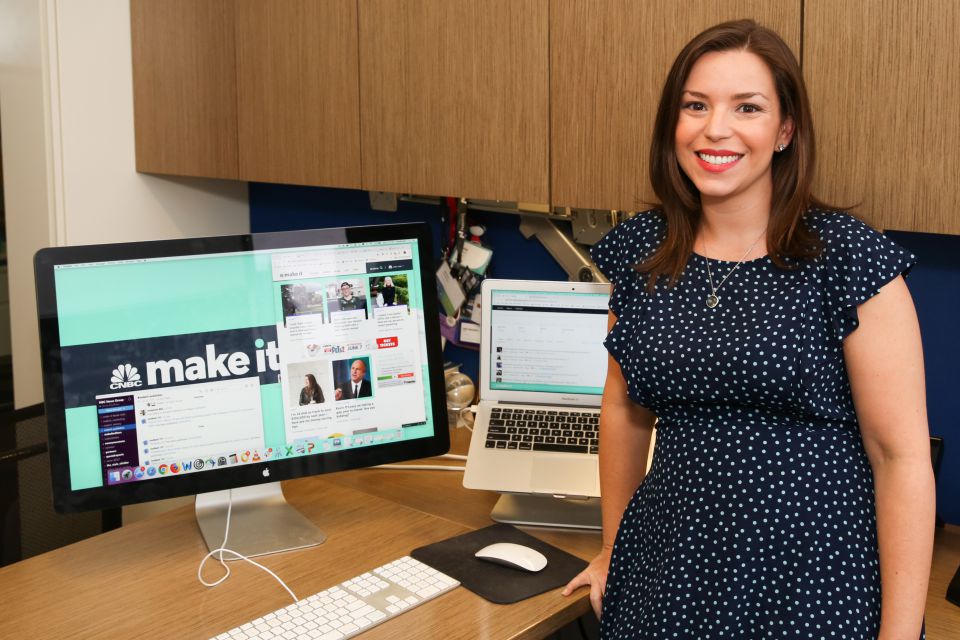
Communications + Public Relations
Creating Content That Empowers Audiences with CNBC's Digital VP and Managing Editor
This week, we interviewed Jenna Goudreau, the VP and managing editor of CNBC Digital. Let's learn how she keeps her powerhouse content creation machine going.
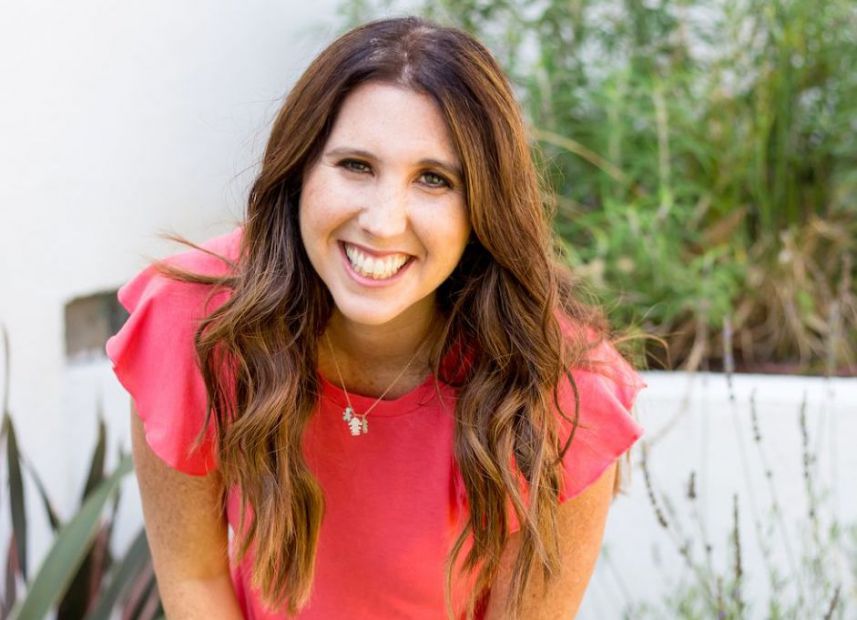
Entertainment
Working Creatively From Home with Cathy Heller
Cathy Heller is a singer, songwriter, entrepreneur, mother—and now, an author. Determined to lift others up to the "happiest versions of themselves," this queen of the hyphenated job title, leads by example. She shared how to build a fulfilling career in a creative field—all while working from home.
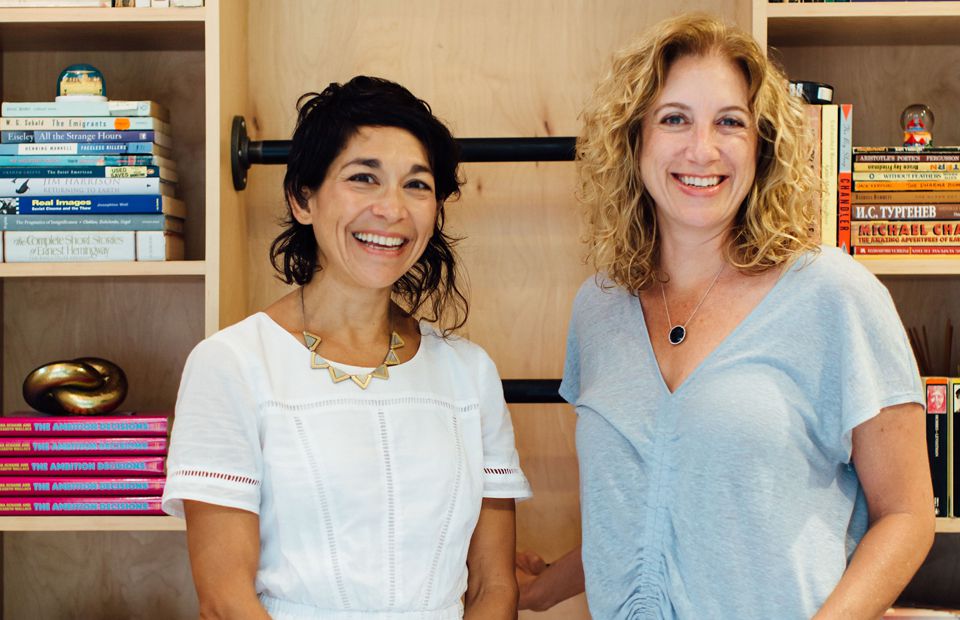
Media
Women, Work, and What It's Like to Write With Your Best Friend—From the Authors of The Ambition Decisions
"We should all give ourselves permission to challenge the things we think can’t be challenged."
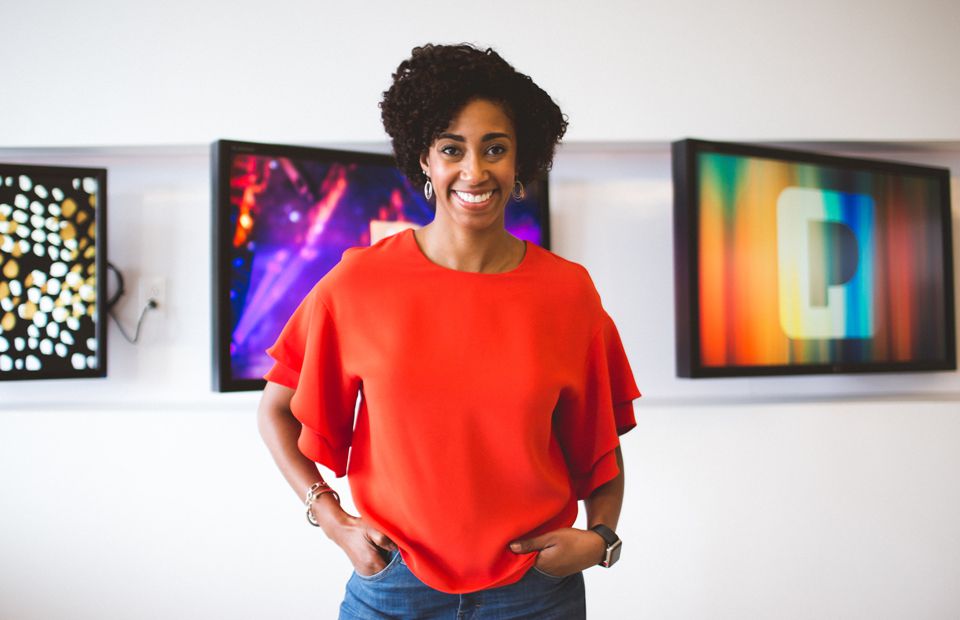
Media
A Director at Pandora on Staying Present, Celebrating Others, and Learning From Failure
"Share your wins, but most importantly, share what your growth areas are, share when you fail, share how you bounced back."
Get the Best Career Advice Delivered To Your Inbox
Join our newsletter to stay in the loop.
